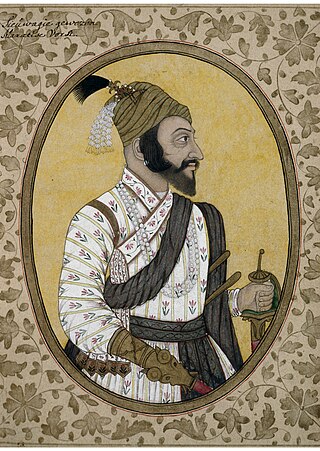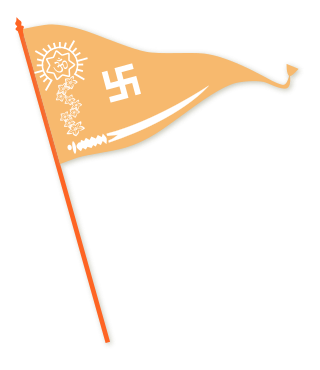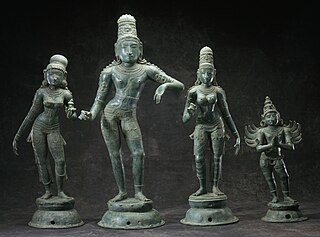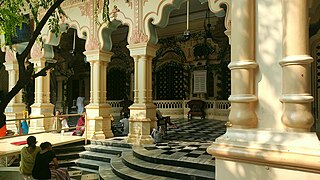
Hindus are people who religiously adhere to Hinduism. Historically, the term has also been used as a geographical, cultural, and later religious identifier for people living in the Indian subcontinent.

A yogi is a practitioner of Yoga, including a sannyasin or practitioner of meditation in Indian religions. The feminine form, sometimes used in English, is yogini.

Shivaji I was an Indian ruler and a member of the Bhonsle Dynasty. Shivaji carved out his own independent kingdom from the declining Adilshahi Sultanate of Bijapur that formed the genesis of the Maratha Empire. In 1674, he was formally crowned the Chhatrapati of his realm at Raigad Fort.
Contemporary groups, collectively termed Hindu reform movements, reform Hinduism, Neo-Hinduism, or Hindu revivalism, strive to introduce regeneration and reform to Hinduism, both in a religious or spiritual and in a societal sense. The movements started appearing during the Bengali Renaissance.

Akhil Bharat Hindu Mahasabha is a Hindu nationalist political party in India.

Dalit, also some of them previously known as untouchables, is the lowest stratum of the castes in the Indian subcontinent. Dalits were excluded from the fourfold varna of the caste hierarchy and were seen as forming a fifth varna, also known by the name of Panchama. Several scholars have drawn parallels between Dalits and the Burakumin of Japan, the Baekjeong of Korea and the peasant class of the medieval European feudal system.

Hinduism is the fourth-largest religion in Malaysia. About 1.78 million Malaysian residents are Hindus, according to 2010 Census of Malaysia. This is up from 1,380,400 in 2000.
Shuddhi is Sanskrit for purification. It is a term used to describe a Hindu religious movement aimed at the religious conversion of non-Hindus of Indian origin to Hinduism.

The history of Hinduism covers a wide variety of related religious traditions native to the Indian subcontinent. It overlaps or coincides with the development of religion in the Indian subcontinent since the Iron Age, with some of its traditions tracing back to prehistoric religions such as those of the Bronze Age Indus Valley Civilisation. Hinduism has been called the "oldest religion" in the world, but scholars regard Hinduism as a relatively recent synthesis of various Indian cultures and traditions, with diverse roots and no single founder. This Hindu synthesis emerged after the Vedic period, between c. 500-200 BCE and c. 300 CE, in or after the period of the Second Urbanisation, and during the early classical period of Hinduism. It flourished in the medieval period, with the decline of Buddhism in India.

Indian nationalism is an instance of territorial nationalism, which is inclusive of all of the people of India, despite their diverse ethnic, linguistic and religious backgrounds. Indian nationalism can trace roots to pre-colonial India, but was fully developed during the Indian independence movement which campaigned for independence from British rule. Indian nationalism quickly rose to popularity in India through these united anti-colonial coalitions and movements. Independence movement figures like Mahatma Gandhi and Jawaharlal Nehru spearheaded the Indian nationalist movement. After Indian Independence, Nehru and his successors continued to campaign on Indian nationalism in face of border wars with both China and Pakistan. After the Indo-Pakistan War of 1971 and the Bangladesh Liberation War, Indian nationalism reached its post-independence peak. However by the 1980s, religious tensions reached a melting point and Indian nationalism sluggishly collapsed. Despite its decline and the rise of religious nationalism; Indian nationalism and its historic figures continue to strongly influence the politics of India and reflect an opposition to the sectarian strands of Hindu nationalism and Muslim nationalism.

Hinduism is the third largest religious group in the United Kingdom, after Christianity and Islam; the religion is followed by around 1.7% of the total population of the nation. Hindus had a presence in the United Kingdom since the early 19th century, as at the time India was part of the British Empire. Many Indians in the British Indian Army settled in the United Kingdom of Great Britain and Northern Ireland. According to 2021 United Kingdom census, 1,032,775 residents (1.7%) identified themselves as Hindus.

Hinduism is the largest religion in India. According to the 2011 Census of India, 966.3 million people identify as Hindu, representing 79.8% of the country's population. India contains 94% of the global Hindu population. The vast majority of Indian Hindus belong to Shaivite and Vaishnavite denominations. India is one of the three countries in the world where Hinduism is the dominant religion.

Annapurna Devi was an Indian surbahar player of Hindustani classical music. She was given the name 'Annapurna' by Maharaja Brijnath Singh of the former Maihar Estate (M.P.), and it was by this name that she was popularly known. She was the daughter and disciple of Allauddin Khan, and the sister of Ustad Ali Akbar Khan. Pandit Ravi Shankar was her first husband, with whom she had a son, Shubhendra Shankar, who was an artist and a sitaritst.

Religion in India is characterised by a diversity of religious beliefs and practices. Throughout India's history, religion has been an important part of the country's culture and the Indian subcontinent is the birthplace of four of the world's major religions, namely, Buddhism, Hinduism, Jainism, and Sikhism, which are collectively known as native Indian religions or Dharmic religions and represent approx. 83% of the total population of India.

Interactions between Muslims and Hindus began in the 7th century, after the advent of the former in the Arabian Peninsula. These interactions were mainly by trade throughout the Indian Ocean. Historically, these interactions formed contrasting patterns in northern and southern India. While there is a history of conquest and domination in the north, Hindu-Muslim relations in Kerala and Tamil Nadu have been peaceful. However, historical evidence has shown that violence had existed by the year 1700 A.D.
Hindu nationalism has been collectively referred to as the expression of social and political thought, based on the native spiritual and cultural traditions of the Indian subcontinent. "Hindu nationalism" is a simplistic translation of हिन्दू राष्ट्रवाद. It is better described as "Hindu polity".
Hindu denominations, sampradayas, traditions, movements, and sects are traditions and sub-traditions within Hinduism centered on one or more gods or goddesses, such as Vishnu, Shiva, Shakti and so on. The term sampradaya is used for branches with a particular founder-guru with a particular philosophy.
Ghar Wapsi is the programme of religious conversion to Hinduism from Islam, Christianity, and other religions in India conducted by Indian Hindu nationalist organisations Vishva Hindu Parishad (VHP), Rashtriya Swayamsevak Sangh (RSS) and their allies. The term owes to the Hindu nationalist ideology that all people of India are ancestrally Hindu and, hence, conversion to Hinduism is one of "returning home" to their ancestral roots.


















